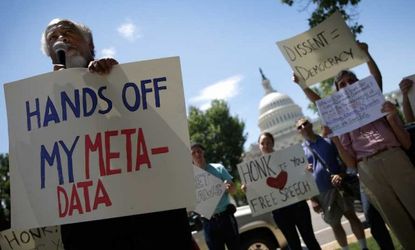Can Americans sue over NSA surveillance?
The government has long argued that since people can't prove they were targeted, they don't have standing to sue. But after Edward Snowden's revelations...


Since the George W. Bush administration's warrantless domestic wiretapping program was uncovered in 2005, some 70 lawsuits have been filed in federal court to challenge the government's broad collection of Americans' telephone and internet data. Nearly all of them have been dismissed, in part because the plaintiffs couldn't show they were targeted by the top-secret programs.
Former National Security Agency contractor Edward Snowden's leaks may have changed that, according to legal scholars and civil libertarians. At least five new lawsuits have been filed since he first revealed in June that the NSA indiscriminately collects and stores some telephone metadata of U.S. citizens.
The "one critical difference from the Bush era," American University national security law expert Stephen Vladeck tells The Washington Post, is that "we now have indisputable physical evidence that the conduct being challenged is actually taking place." That makes it "more likely" that courts will start allowing legal challenges to surveillance practices, Vladeck adds.
Subscribe to The Week
Escape your echo chamber. Get the facts behind the news, plus analysis from multiple perspectives.

Sign up for The Week's Free Newsletters
From our morning news briefing to a weekly Good News Newsletter, get the best of The Week delivered directly to your inbox.
From our morning news briefing to a weekly Good News Newsletter, get the best of The Week delivered directly to your inbox.
On June 8 in San Francisco, U.S. District Judge Jeffrey White took a first big step toward allowing the laws to be challenged on Fourth Amendment grounds. White ruled that a 2008 lawsuit, Jewel v. NSA, filed by the Electronic Frontier Foundation against NSA "dragnet" phone-data collection, didn't fit under the Obama administration's invocation of "state secrets" privileges, in part because of "the multiple public disclosures of information regarding the surveillance program." The EFF's Kurt Opsahl was ebullient:
CNET's Declan McCullagh is a little more measured, noting that White's ruling "is anything but a final decision." But, he adds, "overcoming the hurdle of the administration's 'state secrets' claims is still a major step," and one that allows the case to continue.
On Monday, another little beam of transparency shone through, as the chief judge of the secretive Foreign Intelligence Surveillance Court — charged with overseeing the NSA surveillance, and accused of being a rubber stamp — urged the Obama administration to declassify its ruling that allegedly compelled Yahoo and other internet providers to turn over customer data. That's a win for Yahoo, which wants to prove it fought on behalf of its users, but also a potential window into the FISA court's legal rationale for allowing metadata collection.
What's more, says The Washington Post's Carol D. Leonnig, FISA court Judge Reggie B. Walton's "order was released on a public docket the court recently created after revelations about National Security Agency programs." That itself is a big step for the reticent "spy court, which hears arguments in sealed, windowless courtrooms and has treated all its opinions as classified secrets."
Sign up for Today's Best Articles in your inbox
A free daily email with the biggest news stories of the day – and the best features from TheWeek.com
In practice, though, Americans still face the same hurdle to challenging the surveillance laws — specifically the 2008 expansion of FISA court oversight — in federal court, says Adam Liptak in The New York Times. In February, the Supreme Court sided 5-4 with U.S. Solicitor General Donald Verrilli Jr. and rejected a challenge to the 2008 law from Amnesty International. They relied, says Liptak, on a commitment from Verrilli:
He said, a little comically in retrospect, that the human rights groups, lawyers and reporters who sought to challenge the law had no particular reason to think that their communications were being collected.... If the government wants to use information gathered under the surveillance program in a criminal prosecution, he said, the source of the information would have to be disclosed. The subjects of such surveillance, he continued, would have standing to challenge the program. [New York Times]
Since the Supreme Court ruling, however, federal prosecutors in Miami and Chicago have refused to say if the 2008 law was used to target defendants accused of plotting to blow up targets in New York and Chicago, respectively. In effect, and contrary to Verrilli's assurances, Liptak says, these prosecutors "have immunized the surveillance program from challenges under the Fourth Amendment, which bans unreasonable searches and seizure."
Even if all the challenges to NSA surveillance end up being thrown out, says The Washington Post's Jerry Markon, "the lawsuits could still serve a larger purpose for opponents of the programs by raising public awareness of the issues surrounding surveillance and possibly forcing the government to make changes or disclose more." Previous lawsuits have led to changes at the U.S. prison camp at Cuba's Guantanamo Bay and a public acknowledgment of the U.S. drone program.
Whoever is president, "the government does things to avoid embarrassment," University of Pittsburgh law professor Jules Lobel tells The Washington Post. "And lawsuits are a key pressure point."
Create an account with the same email registered to your subscription to unlock access.
Peter has worked as a news and culture writer and editor at The Week since the site's launch in 2008. He covers politics, world affairs, religion and cultural currents. His journalism career began as a copy editor at a financial newswire and has included editorial positions at The New York Times Magazine, Facts on File, and Oregon State University.
-
 Is pop music now too reliant on gossip?
Is pop music now too reliant on gossip?Talking Point Taylor Swift's new album has prompted a flurry of speculation over who she is referring to in her songs
By Richard Windsor, The Week UK Published
-
 Nuclear near-misses
Nuclear near-missesThe Explainer From technical glitches to fateful split-second decisions, the world has come to the brink of nuclear war more times than you might think
By Rebecca Messina, The Week UK Published
-
 What is cloud seeding and did it cause Dubai's severe rainfall?
What is cloud seeding and did it cause Dubai's severe rainfall?The Explainer The future is flooded
By Devika Rao, The Week US Published
-
 Arizona court reinstates 1864 abortion ban
Arizona court reinstates 1864 abortion banSpeed Read The law makes all abortions illegal in the state except to save the mother's life
By Rafi Schwartz, The Week US Published
-
 Trump, billions richer, is selling Bibles
Trump, billions richer, is selling BiblesSpeed Read The former president is hawking a $60 "God Bless the USA Bible"
By Peter Weber, The Week US Published
-
 The debate about Biden's age and mental fitness
The debate about Biden's age and mental fitnessIn Depth Some critics argue Biden is too old to run again. Does the argument have merit?
By Grayson Quay Published
-
 How would a second Trump presidency affect Britain?
How would a second Trump presidency affect Britain?Today's Big Question Re-election of Republican frontrunner could threaten UK security, warns former head of secret service
By Harriet Marsden, The Week UK Published
-
 'Rwanda plan is less a deterrent and more a bluff'
'Rwanda plan is less a deterrent and more a bluff'Instant Opinion Opinion, comment and editorials of the day
By The Week UK Published
-
 Henry Kissinger dies aged 100: a complicated legacy?
Henry Kissinger dies aged 100: a complicated legacy?Talking Point Top US diplomat and Nobel Peace Prize winner remembered as both foreign policy genius and war criminal
By Harriet Marsden, The Week UK Last updated
-
 Trump’s rhetoric: a shift to 'straight-up Nazi talk'
Trump’s rhetoric: a shift to 'straight-up Nazi talk'Why everyone's talking about Would-be president's sinister language is backed by an incendiary policy agenda, say commentators
By The Week UK Published
-
 More covfefe: is the world ready for a second Donald Trump presidency?
More covfefe: is the world ready for a second Donald Trump presidency?Today's Big Question Republican's re-election would be a 'nightmare' scenario for Europe, Ukraine and the West
By Sorcha Bradley, The Week UK Published